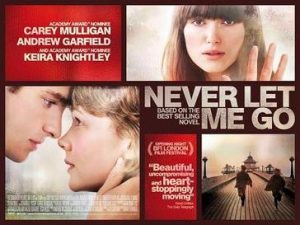
(Judge Dredd Megazine, Rebellion)
Never Let Me Go is based on the acclaimed novel of the same name by British author Kazuo Ishiguro, best known for his period piece The Remains of the Day. Never Let Me Go is also a period piece of sorts; in fact, the setting is one of the most interesting things about it. An opening caption refers to a “breakthrough” in medical science in 1952, meaning that doctors could cure previously incurable conditions and boost life expectancy to over a century. The film, then, is set in a boldly different alternate world, with plenty for the filmmakers to show. Just imagine all those Methuselah great-great-granddads, clogging up the House of Lords.
However, we don’t see any of that. Instead, this is a weirdly underpopulated Britain where we never see, say, a pundit, politician or policeman. Rather, the film opens with a mixed British boarding school in 1978, where the children always stay in the grounds, having been taught it’s death to stray outside; nor are there any parental visits and the kids’ presents are brought in impersonal bulk. The pervading mystery has echoes of the French art film Innocence from 2004, in which the nature of the school stayed enigmatic to the end. In contrast, Never Let Me Go tips its hat half an hour in; I won’t spoil the “surprise,” but some of you will have guessed it from the above summary, and even teen filmgoers will find the idea old.
After the school overture, the rest of the story follows three of the kids into young adulthood: Carey Mulligan from An Education, Spider-Man elect Andrew Garfield, and a catty Keira Knightley. And… and… Well, I wish there was something more to say. There’s the inevitable love-triangle, and to-ings and fro-ings (the characters are now able to move around England with seeming freedom), and a dogged refusal on the film’s part to turn into any of the other possible films that the audience expects. The world is more incoherent and incomprehensible than the dumbest sci-fi blockbusters (though it strikes me it would have made much more sense if this was a world where Hitler won – no sign of that, though.)
The action moves at a Mogadon pace, embalmed in embarrassingly pretty backgrounds and music and halting, uncomfortable conversations between the three pretty players. If the end-titles don’t provoke incredulous cries of “Is that it?,” then it’s because the audience has fallen asleep.
(c) 2018 Rebellion A/S. Reprinted with permission.
[amazon_link asins=’B00FZC1H0A,B003SX0O7U’ template=’ProductGrid’ store=’anime04c-21′ marketplace=’UK’ link_id=’a5739d80-1228-11e9-909d-37b890bb0399′]